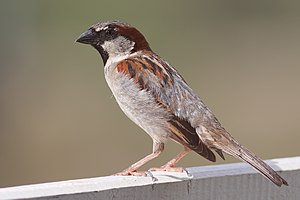 Image via Wikipedia
Image via Wikipedia
That statement made me wonder about homosexual birds? We have several birdhouses in our yard and for a couple years now we’ve watched a very gregarious male House Sparrow trying to defend one house against some persistent females that want to join him in the spring. He sits on the roof and sings and sings. When a male approaches he gets very excited, hops around and tries to show him his fancy, yet functional Wild Birds Unlimited bachelor pad.
 Image via Wikipedia
Image via Wikipedia
And you may also remember the highly publicized case of Roy and Silo. Wikipedia writes: “Roy and Silo are Chinstrap Penguins who were a male-male pair in New York City's Central Park Zoo. The pair was observed trying to hatch a rock as if it were an egg. They also attempted to steal eggs from other penguin couples. When the zoo staff realized that Roy and Silo were both male, it occurred to them to give them the second egg of a mixed-gender penguin couple, a couple which previously had been unable to successfully hatch two eggs at a time. Roy and Silo hatched and raised the healthy young chick.”
The open discussion of homosexual behavior in animals is relatively new. Although noted by scientists, this kind of observation was usually tacked onto scientific papers as a curiosity and not pursued as a legitimate research subject.
The open discussion of homosexual behavior in animals is relatively new. Although noted by scientists, this kind of observation was usually tacked onto scientific papers as a curiosity and not pursued as a legitimate research subject.
.
Recently, Nature.com reported about a new study published in Animal Behaviour that analysed records of 93 bird species that have exhibited homosexual behaviour in the wild. The article stated: "They found that same-sex courtship, mounting and pair-bonding are prevalent: 38% of these species display female–female sexual behaviour and 82% participate in male–male behaviour. In some species, nearly one-third of all sexual endeavours are female–female, and up to two-thirds are male–male. But overall, homosexual activity accounts for less than 5% of sexual encounters in the species they studied."
 Image via Wikipedia
Image via Wikipedia
Yale ornithologist Richard Prum told The New York Times in their article Can Animals Be Gay?: “Homosexuality is a tough case, because it appears to violate that central tenet, that all of sexual behavior is about reproduction. The question is, why would anyone invest in sexual behavior that isn’t reproductive?”
.
The new study suggests: "Birds may engage in homosexual behaviour to practice courtship displays, reduce social tension or solidify dominance. Or the behaviour could help them to form alliances, share care-taking responsibilities or gain access to resources. Despite the wealth of explanations, it is not clear whether homosexuality is a neutral by-product of evolution or whether it serves an adaptive function."
There are still a lot of unanswered questions. Why was the male red-wing with all those females? Is my House Sparrow gay? I don’t know.
There are still a lot of unanswered questions. Why was the male red-wing with all those females? Is my House Sparrow gay? I don’t know.

No comments:
Post a Comment